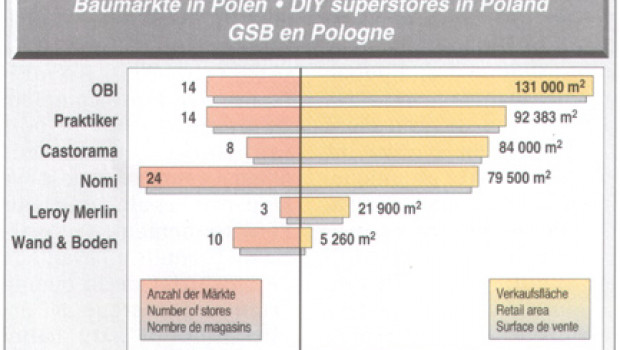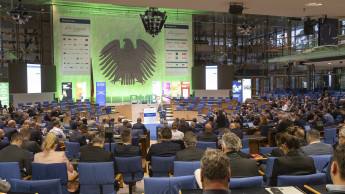The signs on the DIY market continue to point to expansion in the transition countries of Poland, the Czech Republic and Hungary. Store operators have great plans for Poland in particular. The pace of expansion in the Czech Republic and Hungary is more restrained
Poland
Poland with its population of 38 million is the largest of the transition countries. Economic growth has eased off here. In 1997 gross domestic product rose by just under 7 per cent, in 1999 the increase was 4.1 per cent. Annual growth should amount to between 4 and 5 per cent in the medium term. The rate of inflation has more than halved in two years, from 15.9 per cent still in 1997 to a recorded average of 7.3 per cent in 1998. Hopefully it will be reduced to 4 per cent by 2003.
New DIY superstore openings last year were considerable. Castorama had eight stores by the end of 1999 after five new openings. Three new Castorama locations have been announced for this year (Bydgoszez, Gdansk and Sosnourec). In November 1999 the Nomi DIY chain, in which Kingfisher has acquired an interest, started up a show store at Lódz where attention is focused chiefly on customer care and service. For this year six new openings with a retail area of 3 700 m2 have been announced. Three stores were opened already in May. They are located at Belchatów, Radom and Siemianowice/Katowice. Following these in July will be one store each in Pitroków and Tarnów, and a new opening has been announced for August at Jelenia Góra. Twelve new stores are on the expansion schedule for 2001, eleven of which will have a retail area of 3 700 m2 (Slaskie, Trybunalski, Przemysl, Swietochlowice, Zyrardrów, Pila, Zamosc, Rzeszów, Kielce, Inowroclaw and Tczew). A superstore of 5 800 m2 is to start up in Pabianice.
Praktiker got four stores off to a start last year. Expansion has continued this year as well, with one new store each in Lódz, Kielce, Zabrze and Olsztyn. Further new openings have been announced for 2001. The goal of the Kirkel-based concern is to operate 25 Praktiker stores in Poland altogether.
OBI went for expansion in Poland last year, increasing its total of stores to twelve. The first Polish OBI was officially opened at Tychy in March 1998. At the end of 1998 OBI took over the three Polish Stinnes DIY stores and secured for itself further planned Stinnes locations as well. These outlets were then opened as OBI stores in 1999. Altogether there were nine OBI openings on record in Poland last year. This year one store started up at Kielce in March and one at Lódz in April. Five more stores are to follow this year (Bydgoszcz, Lublin, Walbrzych, Torun and Kattowice).
Wand & Boden was still operating nine outlets at the end of 1998, though a new opening at Swarzedz/Poznan this March has increased the store total to ten.
Bricomarché will be the first French DIY trading group to get a foothold in Poland. The opening of its first franchise store is announced for this year at Zary.
Czech Republic
The will to reform has abated in the Czech Republic. Changes are making only slow progress, despite the country’s economic crisis. The start of the reform process was marked by a stabilisation of the economy. However, business reforms failed to materialise, which had an equally negative effect on economic growth as did the lack of reforms in the financial sector. During the past two years the country has been in recession. Modest growth of gross domestic product is expected for the coming year as well.
The German DIY multiples Globus, Hornbach, OBI and Bauspezi are continuing their drive for expansion in the Czech Republic.
Hornbach started up its second Czech branch at Brno in mid-February. The opening of another Czech Hornbach in Ostrava has been announced for the second half of the year.
Bauspezi opened its first store in the Czech Republic in July 1999, followed by the second new opening in December. Three locations are being planned for this year (Jihlava, Policka and Zlín). Following four new openings last year, OBI increased its number of stores in the Czech Republic to twelve. One store each for Havirov and Brno have been announced for the year 2000.
After two new openings Austrian market leader Baumax concluded the year 1999 with a total of 16 stores in the Czech Republic. The opening of three further DIY stores (Frydek-Mystek, Jihlava and Zlín) is planned for this year. What is more, the existing branches at Mladá Boleslav and Olomouc are to be extended. Bauhaus, after one new opening in 1999, intends to get one further store off to a start in the Czech Republic this year. Globus opened three DIY stores in 1999, thereby doubling its total of Czech branches. The opening of one location in Prague is scheduled for this year.
Hungary
The economy of Hungary is showing dynamism. Exports in particular are boosting economic activity. In the last five years real GDP has risen by an average of 3.3 per cent. Average economic growth of 4 per cent is expected in the medium term. The fight against inflation has met with success, as in Poland and the Czech Republic too. Whereas the average annual rate of inflation was 18.3 per cent in 1997, it went down to 10 per cent in 1999. This year’s forecast is for a drop to a single figure. An important political stimulus has been introduced in the form of financial support for private building and renovation projects. As a result the number of new-build homes will see significant change at the end of 2000 or in 2001.
In 1999 the expansionary activities of Baumax were focused on the opening of a store 9 000 m2 in size at Budaörs, in the greater Budapest area. The location at Erd, which had become too small, was closed down.
This May the group inaugurated one branch at Nyiregyháza (just under 8 000 m2) and one at Debrecen (10 000 m2). In both cases there is a garden centre of 2 000 m2 with an appropriate outdoor area attached to the DIY superstore. The branches at Székesfehérvar and Szeged are having their retail areas extended.
OBI has increased its number of stores in Hungary to ten with one new opening in Budapest (12 812 m2), Two more new stores are planned for Hungary this year.
Praktiker started up three Hungarian branches in the second half of 1999 (Keskemét, Nyiregyháza and Miskolc). The next new opening will not be until 2001 in Budapest.
The French multiple Bricostore opened its fourth Hungarian DIY store at the end of March. This is located at Fót in the greater Budapest area. The retail area includes a garden centre and covers 12 000 m2. The group has announced the opening of one more Bricostore branch in Hungary for this year. The plan is for two more stores to be inaugurated each year. Locations on the schedule are Székesfehérvar, Pecs, Szeged, Debrecén, Nyiregyháza, Miskolc and Keskemét.
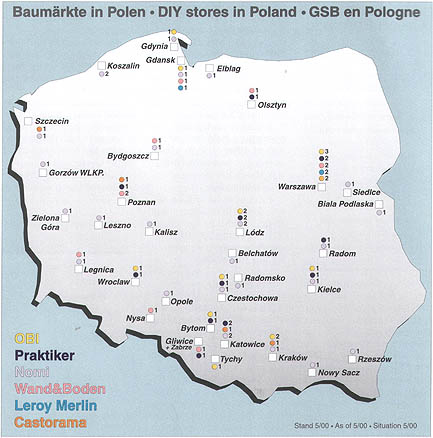
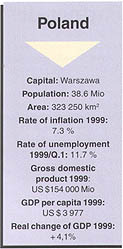
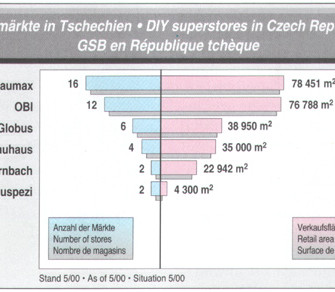
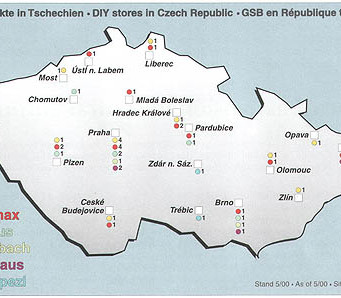
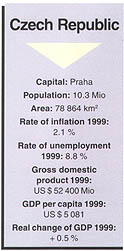
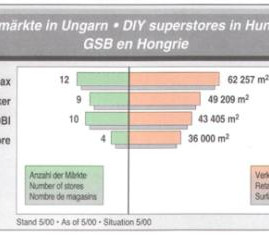
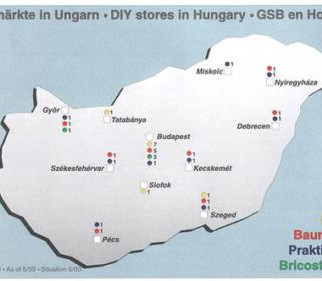
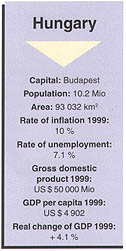

 Menü
Menü




